When I first heard a patient gasp at the price quote for dental implants in Dallas, I realized how many people are genuinely shocked by the investment required. “Why does something so small cost so much?” she asked, holding up her thumb and forefinger to show the size of a single implant. It’s a fair question that deserves a comprehensive answer, especially in a city like Dallas where healthcare costs can vary dramatically from one practice to another.
Key Takeaways
- Advanced technology and materials drive up costs, with titanium implants and cutting-edge equipment requiring significant investment
- Specialist expertise commands premium pricing, as oral surgeons and prosthodontists undergo years of additional training beyond dental school
- Dallas market factors including high real estate costs, premium location fees, and competitive positioning affect pricing structures
- Long-term value often justifies the initial expense, with implants lasting 25+ years compared to alternatives requiring frequent replacement
- Multiple cost components include consultation, surgery, materials, lab work, and follow-up care, making the total investment substantial
The reality is that dental implants in Dallas represent one of the most sophisticated procedures in modern dentistry, and understanding why they’re expensive requires looking beyond the surface. Let me break down the complex factors that contribute to these costs and help you understand what you’re actually paying for.
The Technology Investment Behind Every Implant
State-of-the-Art Equipment Costs 💰
Modern dental implant procedures rely on incredibly sophisticated technology that represents massive upfront investments for dental practices. 3D imaging systems alone can cost between $150,000 to $400,000, and that’s just one piece of equipment. These CBCT (Cone Beam Computed Tomography) scanners are essential for:
- Precise bone density measurements
- Accurate implant placement planning
- Identifying potential complications before surgery
- Creating detailed surgical guides
Computer-guided surgery systems add another layer of expense, with some platforms costing over $100,000 just for the software and hardware. These systems ensure millimeter-perfect placement, but the technology comes at a premium that gets reflected in patient costs.
Advanced Materials and Manufacturing
The implants themselves aren’t just simple screws – they’re bioengineered marvels made from medical-grade titanium that undergoes specialized surface treatments. The manufacturing process involves:
- Precision machining to tolerances measured in micrometers
- Surface modifications that promote bone integration
- Quality control testing that exceeds FDA requirements
- Sterile packaging and handling protocols
Each implant represents months of research, development, and testing, with manufacturers investing millions in creating products that will last decades in the human body.
Specialist Expertise Commands Premium Pricing
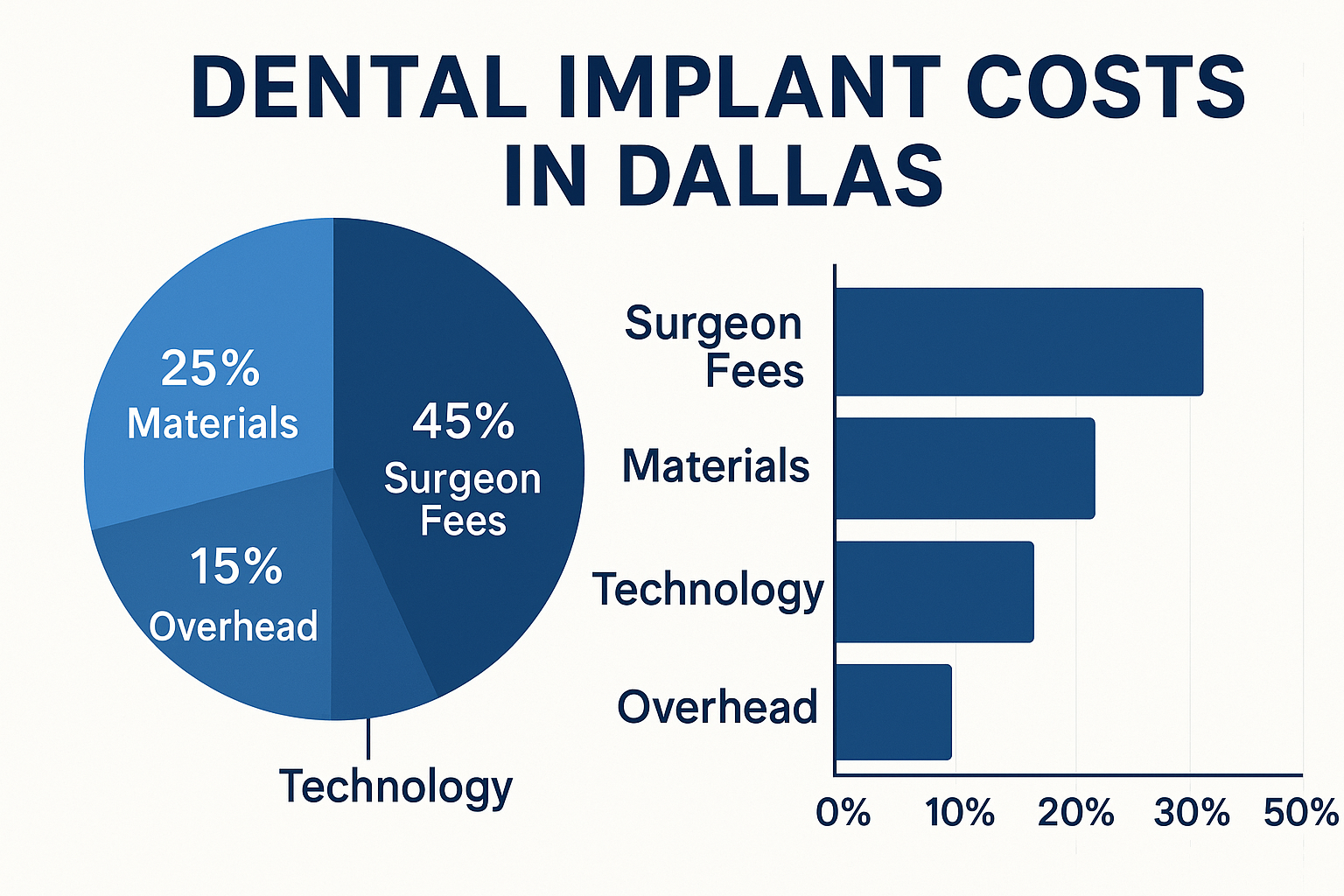
Years of Additional Training
When you’re paying for dental implant treatment, you’re investing in expertise that goes far beyond general dentistry. Oral surgeons complete:
- 4 years of dental school
- 4-6 years of oral surgery residency
- Ongoing continuing education requirements
- Board certification processes
Prosthodontists who handle the crown restoration follow a similar path with 3 additional years of specialized training focused on tooth replacement and restoration.
The Learning Curve Investment
Experienced implant specialists have typically placed thousands of implants, but reaching that level of expertise requires significant investment in:
- Advanced training courses costing $10,000-$50,000 each
- Mentorship programs with established specialists
- Practice on cadavers and simulation models
- Continuing education to stay current with evolving techniques
This expertise directly translates to better outcomes, fewer complications, and more predictable results – but it comes at a cost that’s reflected in treatment fees.
Dallas Market Dynamics and Regional Factors
Real Estate and Overhead Costs 🏢
Dallas consistently ranks among the top metropolitan areas for business costs, and dental practices aren’t immune to these market pressures. Prime locations in areas like:
- Uptown Dallas – $40-60 per square foot annually
- Preston Center – $35-50 per square foot annually
- Las Colinas – $30-45 per square foot annually
These overhead costs directly impact treatment pricing, as practices must cover their operational expenses while maintaining profitability.
Competition and Market Positioning
The Dallas dental market is highly competitive, with over 2,000 practicing dentists in the metropolitan area. This creates an interesting dynamic where:
- Premium practices position themselves as luxury providers with corresponding pricing
- High-volume clinics may offer lower prices but with less personalized care
- Specialist referral networks maintain pricing consistency to preserve relationships
Insurance and Payment Realities
Unlike many other major cities, Dallas has a significant population of high-deductible health plan holders, meaning more patients pay out-of-pocket for dental procedures. This market reality allows practices to:
- Price services based on value rather than insurance limitations
- Offer premium treatment options without insurance constraints
- Maintain higher profit margins on elective procedures
Breaking Down the Complete Cost Structure
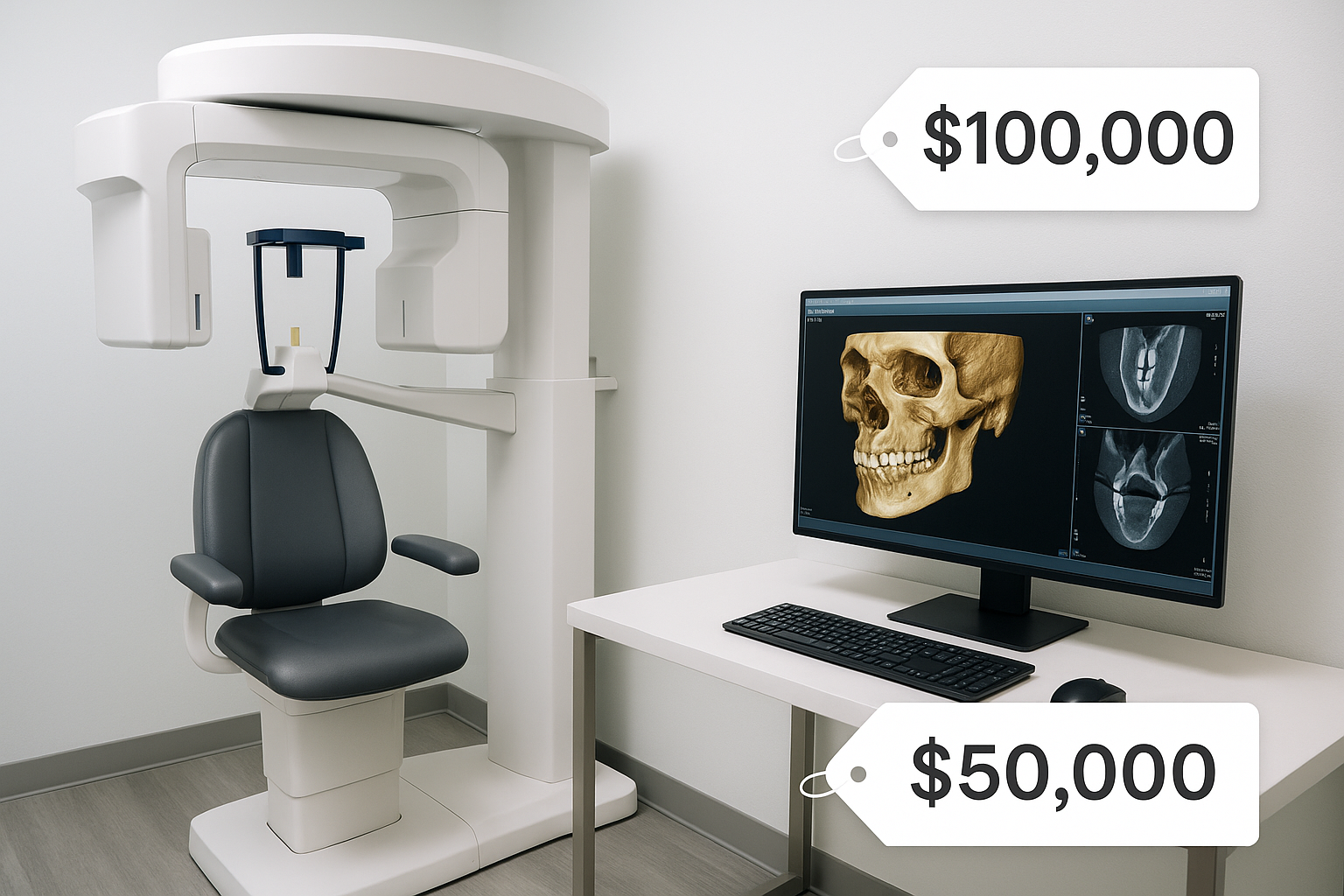
Initial Consultation and Planning Phase
The diagnostic phase alone involves significant costs that many patients don’t consider:
| Service Component | Typical Cost Range | Purpose |
|---|---|---|
| Initial Consultation | $100-$300 | Assessment and treatment planning |
| 3D Imaging (CBCT) | $300-$600 | Detailed bone and tissue analysis |
| Digital Impressions | $150-$400 | Precise measurements for planning |
| Surgical Guide Creation | $200-$500 | Computer-guided placement accuracy |
Surgical Phase Expenses
The actual implant placement involves multiple cost components:
- Surgeon’s professional fee ($1,500-$3,000 per implant)
- Facility and equipment usage ($500-$1,000)
- Implant hardware ($300-$800)
- Anesthesia and sedation ($200-$800)
- Surgical materials ($100-$300)
Restoration Phase Investment
Creating the final crown requires additional specialized work:
- Abutment fabrication ($300-$600)
- Crown creation ($1,200-$2,500)
- Laboratory fees ($400-$800)
- Multiple fitting appointments ($200-$400 total)
Quality Differences That Justify Higher Costs
Premium vs. Budget Implant Systems
Not all implants are created equal, and the differences justify significant price variations:
Premium Systems (Straumann, Nobel Biocare, Zimmer):
- ✅ Extensive research backing (20+ years of studies)
- ✅ Superior surface treatments for faster integration
- ✅ Comprehensive warranty programs
- ✅ Wide range of restoration options
- ✅ Global availability of replacement parts
Budget Systems (Various manufacturers):
- ❌ Limited long-term research data
- ❌ Basic surface treatments
- ❌ Minimal warranty coverage
- ❌ Limited restoration options
- ❌ Potential availability issues
Long-Term Value Proposition
When evaluating why dental implants are expensive in Dallas, consider the lifetime cost comparison:
Dental Implants (25+ year lifespan):
- Initial investment: $3,000-$6,000
- Maintenance costs: Minimal ($100-200 annually)
- Replacement likelihood: Less than 5%
Alternative Treatments:
- Dental Bridge: $2,000-$4,000 initially, replacement every 10-15 years
- Partial Denture: $1,000-$3,000 initially, replacement every 5-7 years
- Complete Denture: $2,000-$5,000 initially, replacement every 5-10 years
Geographic Cost Comparisons Within Texas
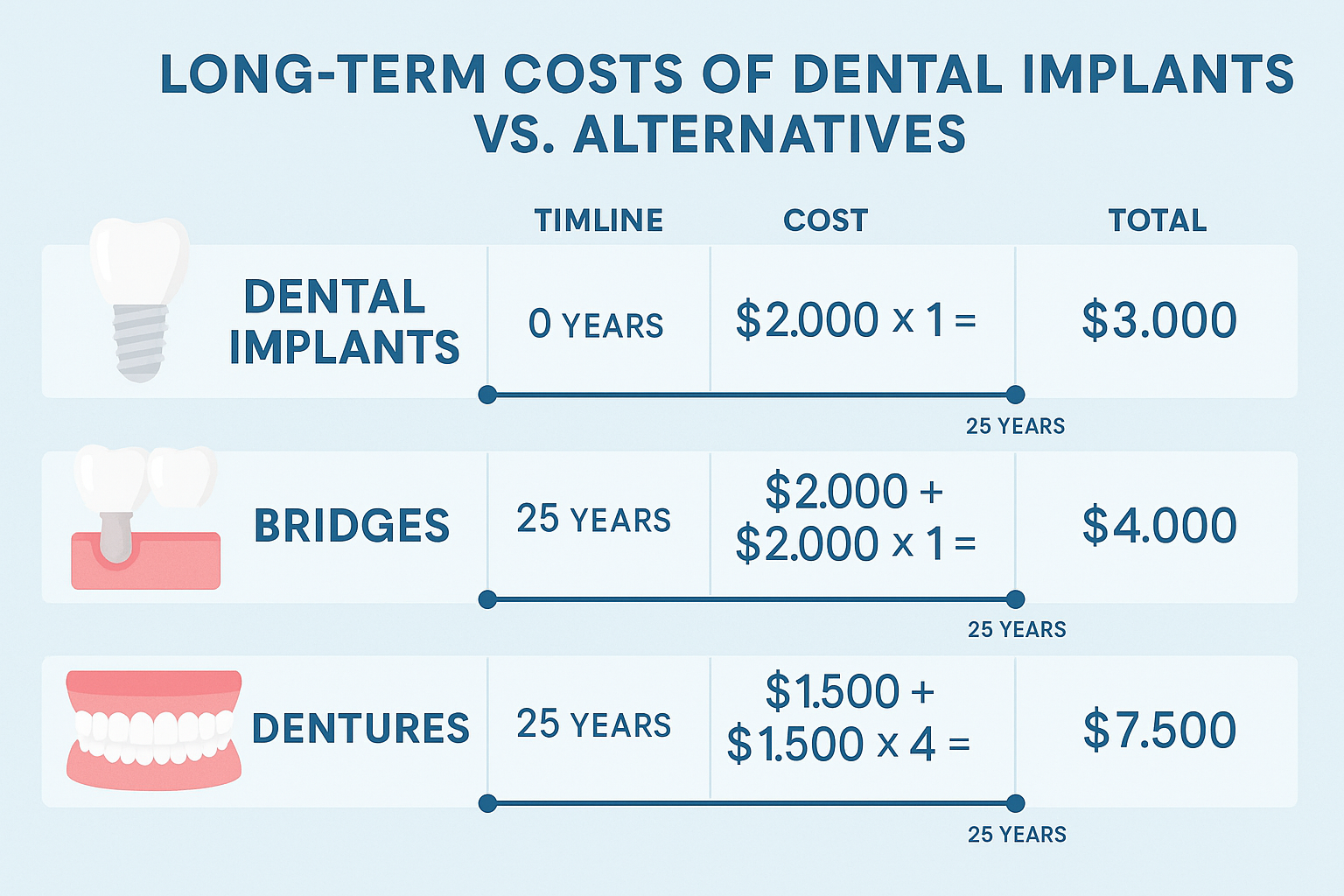
Understanding Dallas pricing requires context from other Texas markets:
| City | Average Implant Cost | Market Factors |
|---|---|---|
| Dallas | $4,000-$6,500 | High overhead, premium positioning |
| Houston | $3,500-$6,000 | Large market, varied pricing |
| Austin | $3,800-$6,200 | Growing market, tech influence |
| San Antonio | $3,200-$5,500 | Lower overhead costs |
| Fort Worth | $3,500-$5,800 | Suburban market dynamics |
Dallas consistently ranks in the higher range due to its affluent patient base and premium practice positioning.
Hidden Costs and Unexpected Expenses
Pre-Surgical Requirements
Many patients require additional procedures before implant placement:
- Bone grafting ($500-$3,000 per site)
- Sinus lift procedures ($1,500-$4,000)
- Tooth extractions ($200-$600 per tooth)
- Gum disease treatment ($500-$2,000)
Potential Complications
While rare, complications can add significant costs:
- Implant failure requiring replacement ($2,000-$4,000)
- Infection treatment ($300-$1,500)
- Nerve damage management ($500-$3,000)
- Sinus complications ($1,000-$5,000)
Insurance Coverage Realities in Dallas
Current Coverage Landscape
Most dental insurance plans provide limited implant coverage:
- Annual maximum limits typically $1,000-$2,000
- Missing tooth clauses that exclude pre-existing conditions
- Waiting periods of 6-12 months for major procedures
- Age restrictions on certain procedures
Medical Insurance Considerations
Some implant-related costs may qualify for medical insurance coverage:
- Accident-related tooth loss often covered
- Cancer treatment complications may qualify
- Congenital conditions sometimes included
- Sleep apnea treatment with implant-supported appliances
Financing Options and Payment Strategies
Practice-Specific Payment Plans
Many Dallas practices offer internal financing:
- Interest-free periods (6-24 months typically)
- Extended payment plans (up to 60 months)
- Discounts for cash payment (5-10% common)
- Package deals for multiple implants
Third-Party Financing
External financing companies provide additional options:
- CareCredit – Healthcare-specific credit lines
- LendingClub – Personal loans for medical expenses
- Prosper Healthcare Lending – Specialized dental financing
- Wells Fargo Health Advantage – Medical credit cards
Making Informed Decisions About Implant Investment
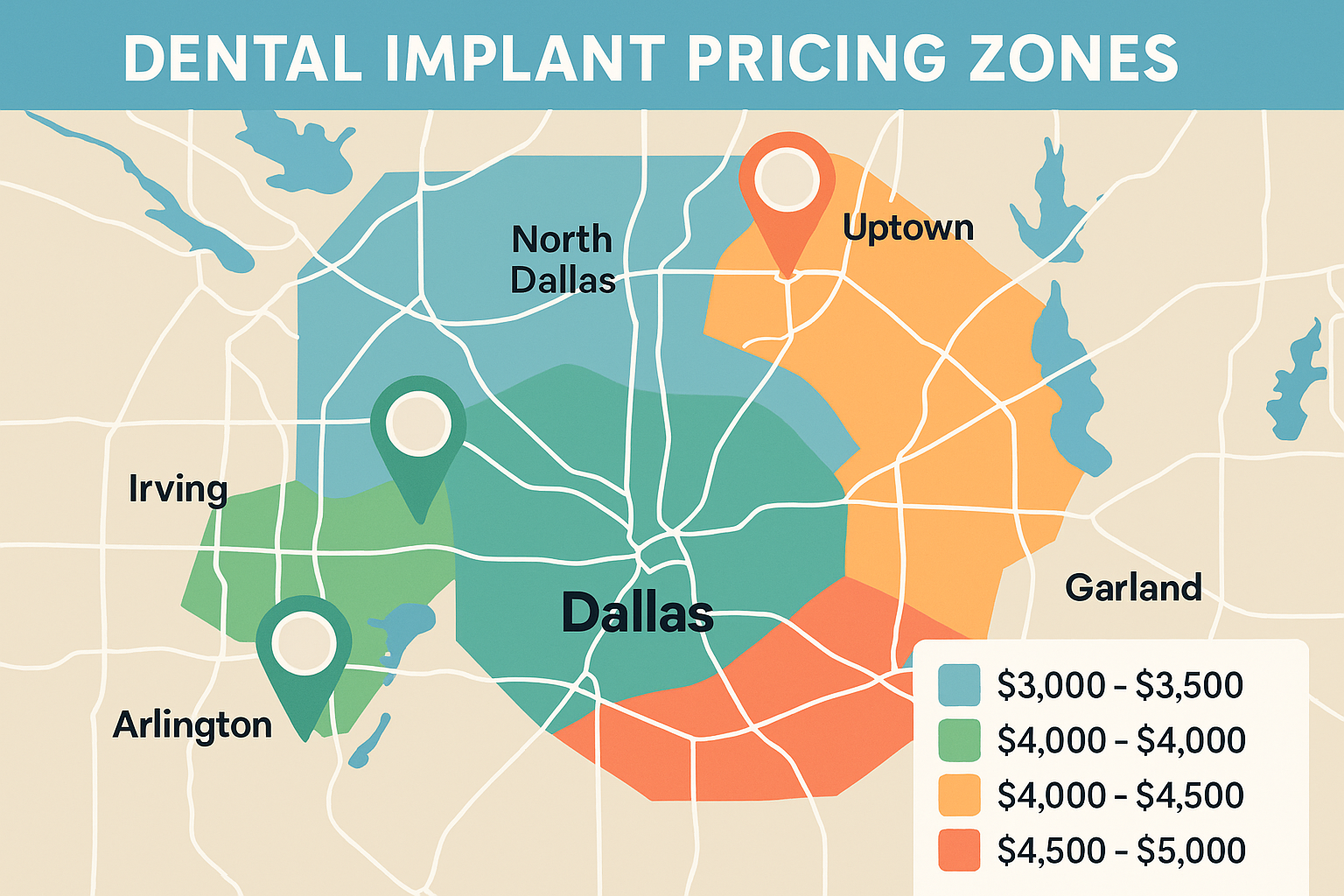
Questions to Ask Potential Providers
Before committing to treatment, ensure you understand:
- What implant system will be used and why?
- What’s included in the quoted price?
- What additional costs might arise?
- What warranty is provided?
- What’s the provider’s experience level?
Red Flags to Avoid 🚩
Be cautious of practices that:
- Offer prices significantly below market rates
- Pressure you to decide immediately
- Won’t provide detailed treatment plans
- Use unrecognized implant brands
- Lack proper credentials or facilities
When considering dental implants, remember that the cheapest option isn’t always the best value.
Dallas Dental Implant Cost Calculator
Alternative Treatment Considerations
When Implants Might Not Be Necessary
Before committing to the significant investment that dental implants represent, consider whether alternatives might meet your needs:
Removable Partial Dentures work well for:
- Temporary tooth replacement solutions
- Patients with significant bone loss
- Budget-conscious patients seeking basic function
- Elderly patients with limited treatment goals
Fixed Bridges may be appropriate when:
- Adjacent teeth need crowns anyway
- Bone quality is insufficient for implants
- Patient preferences favor faster treatment
- Insurance coverage is significantly better
The Psychology of Dental Investment
Making peace with implant costs often requires shifting perspective from expense to investment. Consider that most people:
- Spend $40,000+ on vehicles that depreciate rapidly
- Invest $200,000+ in homes that require ongoing maintenance
- Pay $1,500+ annually for smartphones that become obsolete
Dental implants, by comparison, provide decades of daily use with minimal maintenance requirements and no planned obsolescence.
Future Trends Affecting Dallas Implant Pricing
Technology Advances on the Horizon
Several emerging technologies may impact future implant costs:
3D Printing is revolutionizing implant manufacturing:
- Reduced production costs for custom components
- Faster turnaround times for restorations
- More precise fit and function
- Potential for same-day treatment completion
Robotic Surgery systems are entering the market:
- Enhanced precision and predictability
- Reduced surgery time and patient discomfort
- Higher initial equipment costs but improved outcomes
- Potential for reduced long-term complications
Market Competition Effects
The Dallas dental implant market continues evolving with:
- Corporate dental chains offering standardized pricing
- Specialty practices focusing exclusively on implants
- Technology companies entering direct-to-consumer markets
- Insurance companies expanding coverage options
Conclusion
Understanding why dental implants are expensive in Dallas requires appreciating the complex interplay of factors that contribute to pricing. From the advanced technology and premium materials to the specialized expertise and Dallas market dynamics, every aspect of implant treatment involves significant investment and ongoing costs.
The key insight is that you’re not just paying for a titanium screw – you’re investing in a sophisticated medical device that’s been engineered, tested, and refined over decades. You’re also paying for the expertise of professionals who’ve dedicated years to mastering complex surgical and restorative techniques.
While the initial cost may seem substantial, the long-term value proposition often makes dental implants the most economical choice when compared to alternatives that require frequent replacement and ongoing maintenance.
Your next steps should include:
- Research qualified providers in your area using the criteria outlined above
- Schedule consultations with 2-3 practices to compare approaches and pricing
- Explore financing options to make treatment more manageable
- Consider the long-term value rather than just the upfront cost
- Verify credentials and experience levels of potential providers
Remember that choosing dental implant treatment is a significant decision that will impact your quality of life for decades. While cost is certainly an important factor, it shouldn’t be the only consideration in your decision-making process.
The investment in properly placed, high-quality dental implants typically pays dividends in improved confidence, better oral health, and enhanced quality of life that extends far beyond the financial considerations. When you’re ready to move forward, make sure to work with a qualified provider who can deliver the results that justify the investment you’re making in your oral health.

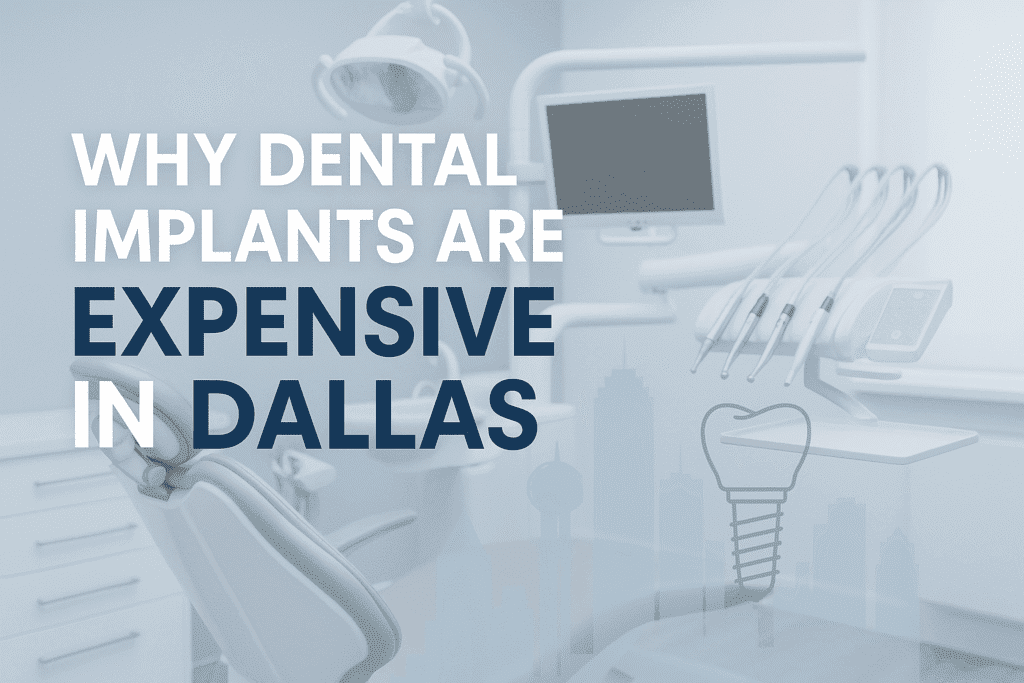
Leave a Reply
Share your thoughts or ask a question about dental implants. Your email address will not be published.